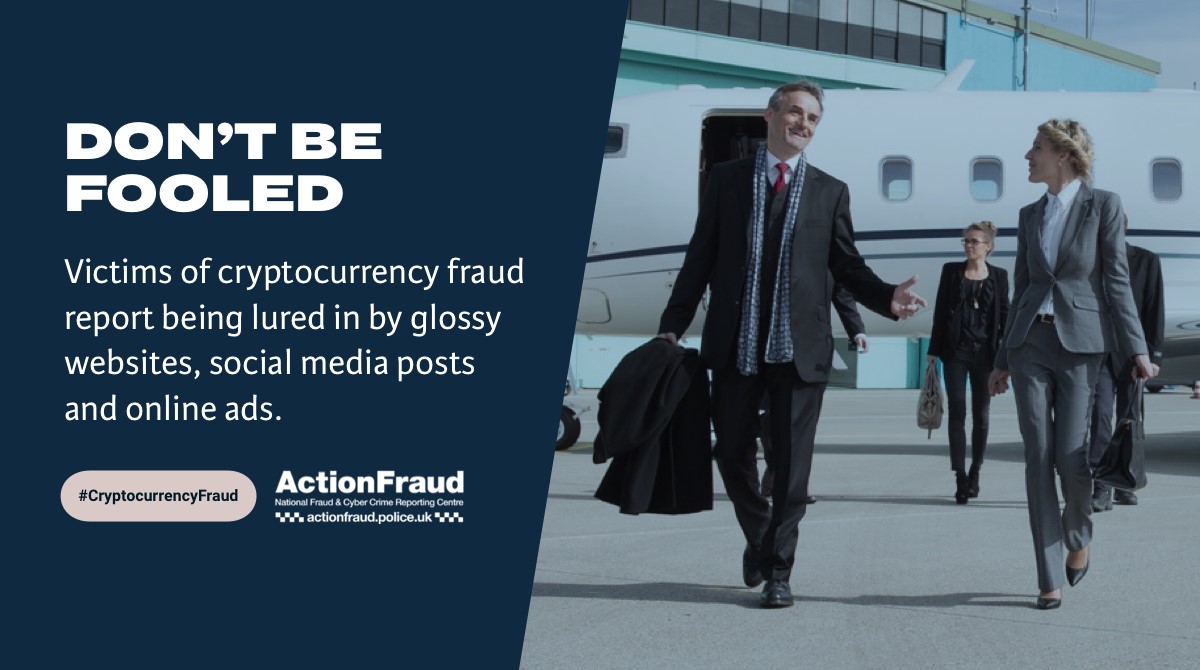Action Fraud is warning the public to remain vigilant when making investments, as criminals cheat hundreds of millions of pounds out of victims through cryptocurrency fraud.

What is cryptocurrency fraud?
Cryptocurrency is a digital or virtual currency designed to work as a medium of exchange. Cryptocurrencies are known for their market volatility so the value of investor’s assets go up and down quickly. As more people have invested their money in cryptocurrencies, criminals have capitalised on this as an opportunity to commit fraud.
Criminals advertise schemes promising, in some cases, high returns through cryptocurrency investing or mining. Frequently advertised on social media, criminals try to lure you in with adverts offering easy money quickly in order to obtain your money or personal information.
One common tactic used to defraud victims is the use of celebrity endorsements. Criminals will present professional and credible looking online adverts, send emails and create websites to advertise fake investment opportunities, including cryptocurrency. Often, fake testimonials are accompanied with a picture of a well-known figure to help the investment seem legitimate. Between April 2020 and March 2021, Action Fraud received 558 investment fraud reports which made reference to a bogus celebrity endorsement – with over three quarters (79 per cent) of reports mentioning cryptocurrency as the commodity they invested in.
How to protect yourself
- Be wary of adverts online and on social media promising high returns on investments in cryptoassets or cryptoasset-related products and be suspicious if you are contacted out the blue about an investment opportunity. This could be via a cold-call, an e-mail or an approach on social media.
- Don’t be rushed into making an investment. No legitimate person or firm will pressure you into making an investment, or committing to something on the spot. Take time to do your research.
- Most firms advertising and selling investments in cryptoassets are not authorised by the Financial Conduct Authorotiy (FCA). This means that if you invest in certain cryptoassets you will not have access to the Financial Ombudsman Service or the Financial Services Compensation Scheme if things go wrong – so always check the FCA Register to make sure you’re dealing with an authorised firm and check the FCA Warning List of firms to avoid.
- Seek advice from trusted friends, family members or independent professional advice services before making a significant financial decision. Even genuine investment opportunities can be high risk.
- Use a financial advisor accredited by the Financial Conduct Authority. Paying for professional advice may seem like an unnecessary expense, but it will help prevent you from being scammed.
- Only use the telephone number and email address on the FCA Register, not the contact details the firm gives you and look out for subtle differences.
- Just because a company has a glossy website and glowing reviews from ‘high net worth’ investors does not mean it is genuine – fraudsters will go to great lengths to convince you they are not a scam.
- Remember, if something sounds too good to be true, it probably is.
If you think you’ve been a victim of an investment fraud, report it to Action Fraud online at www.actionfraud.police.uk or by calling 0300 123 2040. For more information about investment fraud, visit www.fca.org.uk/scamsmart.
Action Fraud also advises that the public follow the advice of the Take Five to Stop Fraud campaign to keep themselves safe from fraud.
- Stop: taking a moment to stop and think before parting with your money or information could keep you safe.
- Challenge: could it be fake? It’s okay to reject, refuse or ignore any requests. Only criminals will try to rush or panic you.
- Protect: if you think you’ve been a victim of fraud, contact your bank immediately and report it to Action Fraud online at actionfraud.police.uk or by calling 0300 123 2040.
